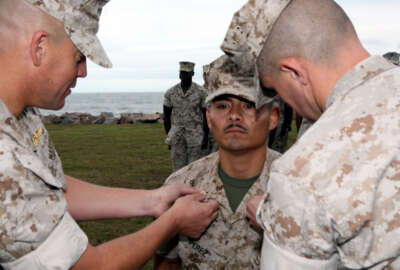The Marine Corps became the latest of the military services to stand up a dedicated series of occupational specialties for cyber late last week, calling it a key step toward improving its readiness and retention of cyber talent.
The move comes almost exactly a year after Gen. Robert Neller, the commandant of the Marine Corps, directed his service to create the new occupational field during an offsite meeting of senior leaders.
And it reflects the growing recognition among senior military officials that they must give service members the option to stay engaged in cyber operations for an entire military career if they have any hope of hanging onto their best talent for more than a couple of years. The new specialties begin at the Marines’ lowest ranks, and go up through lieutenant colonel on the officer side and master gunnery sergeant on the enlisted side.
“’Trigger fingers turn to Twitter fingers’? Not exactly, but this is the next step in professionalizing our cyber force, which will be critical to our success, now and in the future,” Neller wrote in a Twitter message Thursday.
Marine officials have previously said they planned to begin assigning troops to the new occupational field sometime in fiscal 2018, but the announcement formally establishes what the service has designated the Cyberspace Occupational Field and lays out the specific specialties available for service members to begin transferring into.
The new “1700” field creates seven cyber-specific military occupational specialties (MOS), including two for commissioned officers up to the rank of lieutenant colonel, two for warrant officers and three for enlisted personnel. Officials said they would release more information later this year about how Marines could apply for lateral movements into the new MOS positions, but a message released last week laid out high-level job descriptions and the corps’ overall intent.
“The (Cyberspace Occupational Field) provides the Marine Corps with a professionalized, highly skilled workforce that can effectively employ cyberspace capabilities and create effects across the Marine Air-Ground Task Force and support joint requirements,” wrote Lt. Gen. D. J. O’Donohue, the deputy commandant for information. “The OccFld supports the maturation of the Marine Corps’ cyberspace workforce through the establishment of specific career paths, standardized training continuum, and mechanisms to retain trained and qualified Marines within the cyberspace community.”
Within the seven new specialties, some are expected to serve as generalists; others will focus on either offensive or defensive operations in cyberspace.
The two new specialties for commissioned officers (Cyberspace Officer and Cyberspace Warfare Development Officer) fall into the former category, as does one of the new MOS positions for senior enlisted personnel (Cyberspace Operations Chiefs). They’re expected to supervise and direct “all aspects” of cyberspace operations and “possess an overall knowledge of the capabilities, effects, systems, platforms and resources required to conduct” them.
The remaining specialties include two each for offensive and defensive operations. Within those, there is one each for warrant officers and another for enlisted personnel from private to gunnery sergeant.
The offensive billets are to focus on developing and using tools, tactics, techniques and procedures for attacking enemy targets via cyberspace and “conduct detailed planning and analysis of targets of interest in support of Joint and Marine Corps’ requirements.”
The Marines’ Defensive Cyberspace Weapons Officers and Cyberspace Defensive Operators, meanwhile, are charged with defending networks, detecting and mitigating attacks and cyber vulnerabilities. But they’re expected to work closely with their counterparts on the offensive side and others, O’Donohue wrote.
“CDOs recognize and leverage the application of offensive cyberspace operations in order to implement an effective defensive strategy. CDOs coordinate with network and system administrators to ensure the implementation of security controls in support of (DoD Information Network) operations.”
Copyright
© 2024 Federal News Network. All rights reserved. This website is not intended for users located within the European Economic Area.
